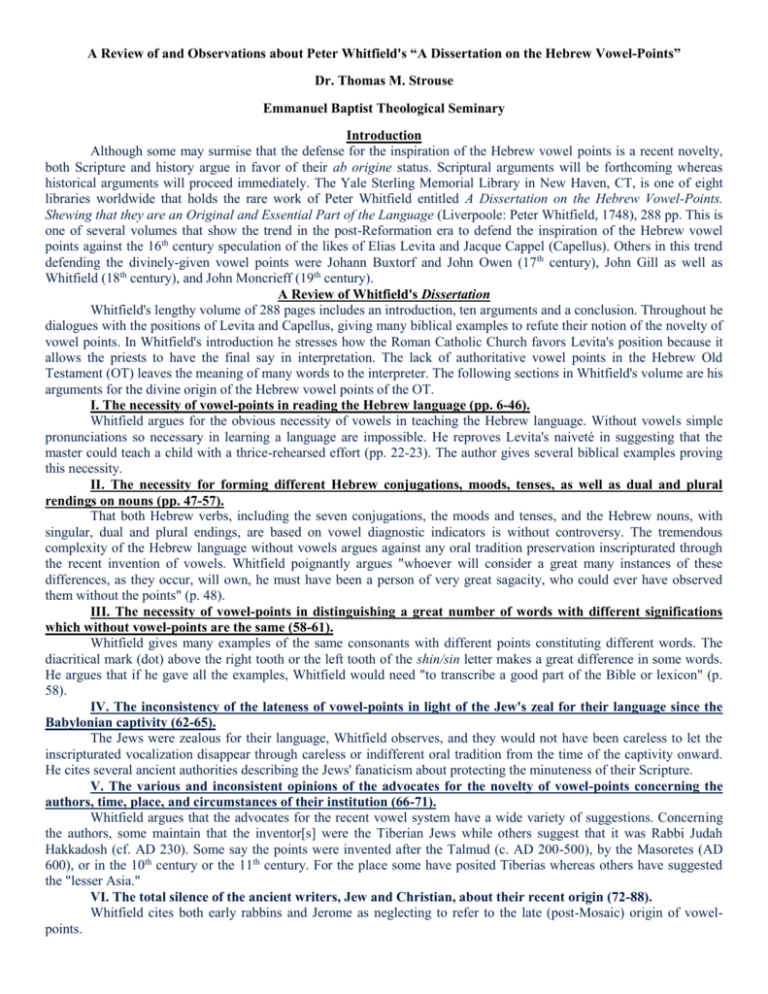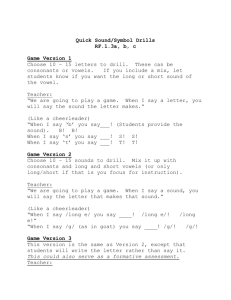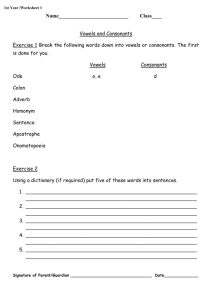Strouse on Peter Whitfield` Vowel Points
advertisement

A Review of and Observations about Peter Whitfield's “A Dissertation on the Hebrew Vowel-Points”
Dr. Thomas M. Strouse
Emmanuel Baptist Theological Seminary
Introduction
Although some may surmise that the defense for the inspiration of the Hebrew vowel points is a recent novelty,
both Scripture and history argue in favor of their ab origine status. Scriptural arguments will be forthcoming whereas
historical arguments will proceed immediately. The Yale Sterling Memorial Library in New Haven, CT, is one of eight
libraries worldwide that holds the rare work of Peter Whitfield entitled A Dissertation on the Hebrew Vowel-Points.
Shewing that they are an Original and Essential Part of the Language (Liverpoole: Peter Whitfield, 1748), 288 pp. This is
one of several volumes that show the trend in the post-Reformation era to defend the inspiration of the Hebrew vowel
points against the 16th century speculation of the likes of Elias Levita and Jacque Cappel (Capellus). Others in this trend
defending the divinely-given vowel points were Johann Buxtorf and John Owen (17th century), John Gill as well as
Whitfield (18th century), and John Moncrieff (19th century).
A Review of Whitfield's Dissertation
Whitfield's lengthy volume of 288 pages includes an introduction, ten arguments and a conclusion. Throughout he
dialogues with the positions of Levita and Capellus, giving many biblical examples to refute their notion of the novelty of
vowel points. In Whitfield's introduction he stresses how the Roman Catholic Church favors Levita's position because it
allows the priests to have the final say in interpretation. The lack of authoritative vowel points in the Hebrew Old
Testament (OT) leaves the meaning of many words to the interpreter. The following sections in Whitfield's volume are his
arguments for the divine origin of the Hebrew vowel points of the OT.
I. The necessity of vowel-points in reading the Hebrew language (pp. 6-46).
Whitfield argues for the obvious necessity of vowels in teaching the Hebrew language. Without vowels simple
pronunciations so necessary in learning a language are impossible. He reproves Levita's naiveté in suggesting that the
master could teach a child with a thrice-rehearsed effort (pp. 22-23). The author gives several biblical examples proving
this necessity.
II. The necessity for forming different Hebrew conjugations, moods, tenses, as well as dual and plural
rendings on nouns (pp. 47-57).
That both Hebrew verbs, including the seven conjugations, the moods and tenses, and the Hebrew nouns, with
singular, dual and plural endings, are based on vowel diagnostic indicators is without controversy. The tremendous
complexity of the Hebrew language without vowels argues against any oral tradition preservation inscripturated through
the recent invention of vowels. Whitfield poignantly argues "whoever will consider a great many instances of these
differences, as they occur, will own, he must have been a person of very great sagacity, who could ever have observed
them without the points" (p. 48).
III. The necessity of vowel-points in distinguishing a great number of words with different significations
which without vowel-points are the same (58-61).
Whitfield gives many examples of the same consonants with different points constituting different words. The
diacritical mark (dot) above the right tooth or the left tooth of the shin/sin letter makes a great difference in some words.
He argues that if he gave all the examples, Whitfield would need "to transcribe a good part of the Bible or lexicon" (p.
58).
IV. The inconsistency of the lateness of vowel-points in light of the Jew's zeal for their language since the
Babylonian captivity (62-65).
The Jews were zealous for their language, Whitfield observes, and they would not have been careless to let the
inscripturated vocalization disappear through careless or indifferent oral tradition from the time of the captivity onward.
He cites several ancient authorities describing the Jews' fanaticism about protecting the minuteness of their Scripture.
V. The various and inconsistent opinions of the advocates for the novelty of vowel-points concerning the
authors, time, place, and circumstances of their institution (66-71).
Whitfield argues that the advocates for the recent vowel system have a wide variety of suggestions. Concerning
the authors, some maintain that the inventor[s] were the Tiberian Jews while others suggest that it was Rabbi Judah
Hakkadosh (cf. AD 230). Some say the points were invented after the Talmud (c. AD 200-500), by the Masoretes (AD
600), or in the 10th century or the 11th century. For the place some have posited Tiberias whereas others have suggested
the "lesser Asia."
VI. The total silence of the ancient writers, Jew and Christian, about their recent origin (72-88).
Whitfield cites both early rabbins and Jerome as neglecting to refer to the late (post-Mosaic) origin of vowelpoints.
VII. The absolute necessity to ascertain Divine authority of the Scripture of the OT (89-119).
The author Whitfield affirms that Scripture is based on words and words are based on consonants and vowels. If
there are no vowels in the Hebrew OT originals, then there is no Divine authority of the Hebrew OT Scriptures, he argues,
citing II Tim. 3:16. Whitfield then gives a vast listing of passages that change meaning when points are lost, and thereby
undermining divine authority.
VIII. The many anomalies or irregularities of punctuation in the Hebrew grammar (120-133).
Whitfield's objection to the novelty of vowel-points is the many exceptions to vowel-point rules, which these
anomalies and irregularities demand a codified system for their exceptions to emphasize a particular point of grammar and
truth.
IX. The importance of the Kethiv readings versus the Keri marginal renderings (134-22] .
The existence of Kethiv (Aramaic for "write") readings in the Hebrew text and Keri (Aramaic for "call") readings
in the margin of Hebrew manuscripts show that the rabbins were serious about preserving the original words, including
the vowel-points, when a questionable word arose in a manuscript. The pre-Christian antiquity of the Keri readings in the
margin demands the pre-Masoretic antiquity of the vowel points.
X. The answer to two material questions (222-282).
Whitfield responds to two of three significant questions in this section: 1) why does the LXX and Jerome's version
differ from the Hebrew text in corresponding vowels on proper names? 2) Why the silence of the Jewish writers on the
pointing prior to the 6th century of Christianity? and 3) Why were unpointed copies used in the Jewish synagogues?
Briefly, he refutes the first questions by stating that the differences in the translations and the Hebrew pointed texts cannot
be attributed to the vowels since the translators obviously did use the pointed copies, and that the Jewish commentators,
coeval with the Masoretes, did in fact refer to the points. The third question, answered later in his book, is resolved by the
fact that there is no historical proof that unpointed copies were used exclusively in the synagogues.
Conclusion
Whitfield concludes his biblical and linguistic defense of the antiquity of the vowels, saying:
[I]t is manifestly impossible the contrary should be a self evident, incontestible, truth; and all the writings which
have been published, in favour of the novelty, cannot make it so; especially as, in them all, very imperfect answers have
been given to any of these arguments for the antiquity; and the principal have not, so much as, been mentioned. And the
character of the learned authors, who have asserted the novelty of the points, is, certainly at least, ballanced by those of
the contrary opinion: for against Elias Levita, Capellus, Walton, etc., we need not blush to place the two
Buxtorfs...Vander Hooght...Gagnier...Scultens (p. 288).
Some Observations regarding the Inspiration of Hebrew Vowels
The aforementioned writers, who have defended the divine origin of the Hebrew vowel points, including
Whitfield, consistently give some basic Scriptural and linguistic arguments that are difficult if not impossible to overturn.
This present author will revisit Whitfield's first three arguments and give fresh examples from the Hebrew text of
Scripture to prove the Biblical necessity of the divinely inspired and preserved Hebrew vowel points.
The Biblical Necessity for Reading and Writing the Hebrew Language
When the Lord renewed His covenant with Israel, He used Moses to write the very same words that were on the
initial tablets (Ex. 34:1 ff.). The Lord said to Moses, "Write thou these words: for after the tenor of these words I have
made a covenant with thee and with Israel" (v. 27). The expression "after the tenor of these words" (`al piy hadevariym
ha'elleh) could be translated literally "on [the basis of] the mouth of these words." The only way Moses could have
written the Lord's spoken words was to hear the vowels in the consonants and then to write the words with the vowels
intact. The Mosaic Law, then, constituted the very written words of Jehovah, including the consonants and vowels.
Furthermore, the Jews were to obey the Mosaic Law in minute detail, not adding to nor diminishing from it (Dt. 4:2).
They were to keep or preserve (shamar) the Law and not forget the things they had seen and were written down in it, and
then to teach their children the Mosaic Law (vv. 6, 9, 10; cf. 6:7; 32:46). These verses conclusively argue against any
notion that the vowel sounds were merely given to Moses who passed on the oral tradition of the pronunciation until the
Masoretes invented a system to approximate the vowels. Levitas' speculation that the Masoretes invented the points has
nothing to commend it but has all Scriptural authority to condemn it.
The initial Psalm addresses the blessed man and his responsibility to delight in and meditate on the law of the
Lord, stating: "But his delight is in the law of the LORD; and in his law doth he meditate day and night" (Ps. 1:2). The
word "meditate" comes from hagah that means "to mutter" and suggests the deliberate pronunciation of the words of
Scripture. It is impossible to recite consonants without vowels and it is impossible to delight (chaphatz) in consonants
with non-authoritative vowels. Again, the fallacious view that man invented the Hebrew vowel points has nothing to
commend it. Is there any reason that Bible believers must countenance the view that the Lord God, the Creator of
language, disdains vowels, at least to the extent that He would preserve them in written form? After all, has not the Lord
Jesus Christ referred to Himself as the Alpha and Omega (Rev. 1:8; 21:6), the first and last vowels of the Greek language?
The Linguistic Necessity for Distinguishing Hebrew Verbs and Nouns.
Hebrew verbs are made up of seven stems, of which are the Qal stem and six derived stems, including the Niphal,
Piel, Pual, Hithpael, Hiphil, and Hophal. These stems apply equally to both the strong and weak verbs. The
differentiation of some of these stems is based on complex vowel pointing, without which tremendous confusion abounds.
The Piel and Pual differ from each other and the Qal stem only by vowels and diacritical marks. The Niphal perfect 3ms
(3rd person, masculine, singular), Niphal imperfect 1cp (1st person, common, plural), and Niphal participle ms differ by
vowel points alone, and both may be confused with the Qal imperfect 1cp except for the points. The imperfect forms for
all of the stems except the Hiphil and Hithpael are identical without points and consequent confusion would abound
without the divinely preserved vowel points. If the stems are significant, which they must be, then their respective vowel
differences are significant, and must be carefully maintained to make sense of any given passage.
For example, in Gen. 1:26, Scripture uses the first of several Qal imperfect 1cp verbs (na`eseh) for God to
designate "let us make" man. However, without vowels this verb could be "he was made" (Niphal [passive] perfect 3ms)
or "we will be made" (Niphal imperfect 1cp). Furthermore, the Niphal participle ms without the pointing would be the
same consonants and mean "being made." Although some might say that the context would always show which
conjugation and tense was divinely inspired, in this case the context would probably eliminate only the participle. Did
Jehovah say "let us make" man, or man "he was made," or "we will be made" man?
Another example should suffice for this point. In response to Isaac's query about the animal sacrifice, Abraham
answered "God will provide (yire'eh) himself a lamb" (Gen. 22:8). Is the verb Qal imperfect 3ms and therefore active
(God will provide for Himself a lamb) or Niphal imperfect 3ms and therefore reflexive (God will provide Himself for a
lamb)? The Masoretic text has the former reading and therefore the answer is that God, and no one else, including
Abraham, will provide the lamb. Without authoritative pointing, the precise theology required here and elsewhere is
forfeited.
With respect to nouns, the endings on masculine nouns are necessary to determine number. In Hebrew nouns may
be singular, dual or plural. Examples of dual masculine nouns include things that come in pairs such as hands, feet, eyes,
ears, etc. The distinctive ending of a masculine dual noun is pathach, yodh, chirek, and mem, in contrast to the distinctive
ending of a masculine plural noun: chirek, yodh, mem. The first verse of the OT Scriptures is instructive. Scripture says,
"In the beginning God created the heaven and earth" (Gen. 1:1). Without authoritative vowels, one would not know that
the word "God" ('elohim) is a masculine plural noun and that the word "heaven" (hashshamayim) is a masculine dual
noun. The Masoretic text teaches that the plural Godhead created the two heavens (first and second). Or was it that the
dual Godhead (yin yang) created a plurality of heavens?
Regarding proper nouns, the consonantal text provides several interesting, but non-authoritative, alternatives to
the Masoretic pointed text. In Proverbs 30:1, did Agur address Ithiel and Ucal? Kidner states,
The Hebrew consonants of this phrase can be revocalized to read: 'I have wearied myself, O God, I have wearied
myself, O God, and come to an end', which introduces the opening theme well. The ancient versions likewise eliminate
the proper names, but fail to agree in their translations. It remains an open question.
If vowel points may be rearranged in proper nouns, what prevents the interpreter from the thorough rearrangement
of major sections of the Hebrew text and thereby the creation of new and false doctrine?
Another example of the alleged need to revocalize the Masoretic text brings consternation to those who maintain
the integrity and originality of the Hebrew vowel points. In the passage that deals with "the great wall" of Aphek, the
Scripture states "there a wall fell upon twenty and seven thousand of the men that were left" (I Ki. 20:30).
Kulus, in citing Donald Wiseman's statement: "The 'thousand' ('eleph) might be revocalized without change of
consonants to 'officer' ('alluph)...the number might represent twenty-seven officers killed," charges some who "will not
hear this number because it is too large!" In this context one would not know if 27,000 men were killed or twenty-seven
officers were killed.
The Necessity of Vowel Points to Distinguish Different Words of the Same Consonants
In Psalm 119, the sin/shin stanza (vv. 161-168), displays an illustration of the necessity for diacritical markings
(i.e., tittles [Mt. 5:18]). The sibilant or "s" letter designated sin looks like a three-pronged comb with a dot over the left
tooth (f). The shin has the same consonantal form but has the diacritical dot over the right tooth (v) and produces the "sh"
consonant. The psalmist declared in v. 164 "Seven times a day do I praise thee because of thy righteous judgments."
Without the diacritical dot over the right tooth of the first consonant in the noun sheva` ("seven"), the word could be the
perfect verb sava` ("he is satisfied"). Therefore the Hebrew text could read "He is satisfied in the day I do praise thee
because of thy righteous judgments." The context cannot render an authoritative solution and hence the text becomes as
wax ready to be twisted by every interpreter.
Moses puns on the nakedness of Adam and Eve and the subtlety of the serpent, using two words with the same
consonants, `arom and `arum, respectively. The only difference between these two adjectives, other than the first is plural
and the second is singular, is the vowel pointing.
What did Moses intend to say: the couple was naked and the serpent was subtle, the couple was subtle and the
serpent was subtle, the couple was subtle and the serpent was naked, or the couple was naked and the serpent was naked?
At this stage in the development of Moses' narrative, it would be impossible to know absolutely without pointing.
Finally, a cursory glance at any elementary Hebrew glossary would show basic words differentiated only by
pointing. For example, one should consider the following: 'l ("God" or "to" or "no"), 'm ("mother" or "if"), 'ph ("nose" or
"also"), 'th ("with" or "you"), bn ("to perceive" or "between"), bqr ("cows" or "morning"), gll ("to roll" or "on account
of"), hw' ("he" or "she"), hnh ("they" or "behold"), zcr ("male" or "to remember"), chwh ("to bow" or "Eve"), lchm ("to
fight" or "bread"), mn ("from" or "manna"), ngs/ngsh ("to beat" or "to draw near"), `d ("witness" or "unto"), `wr ("to
arouse" or "skin"), `m ("people" or "with"), prs/prsh ("to spread out" or "horseman"), r` ("friend" or "evil"), and shm
("name" or "there"). With these words, some verbs, some nouns, some adjectives, some adverbs, and some pronouns,
making up thousands of contextual possibilities, it would ludicrous to suggest vowels were not originally inscripturated.
Conclusion
Whitfield's volume draws attention to the ongoing attack upon the authority of Scripture. He argues succinctly for
the Scriptural and linguistic necessities of the inspiration and preservation of the vowel points of the OT Hebrew text. He
is in the list of defenders of the preservation of the Hebrew vowels. Those that would attempt to overthrow the biblical
and linguistic arguments marshaled by these scholars must do so on the basis of several presuppositions. They must
presuppose that the Scripture does not teach the preservation of the words of the Lord, that Hebrew may be learned
precisely and preserved without authoritative vowels, and that the Lord God, for some unknown reason, disdains the
preservation of vowels along with His inspired and preserved consonants. This essay has refuted all three fallacious
presuppositions. The real issue is the one of final authority. Who has the last say about the Old Testament, and
consequently about all of the Scripture--the Roman Catholic Church, the Masoretes, modern scholars, or the Lord Jesus
Christ? Will professed Bible believers allow the Lord to speak authoritatively through His Old Testament words?
-- Converted from PDF to Word by Herb Evans






